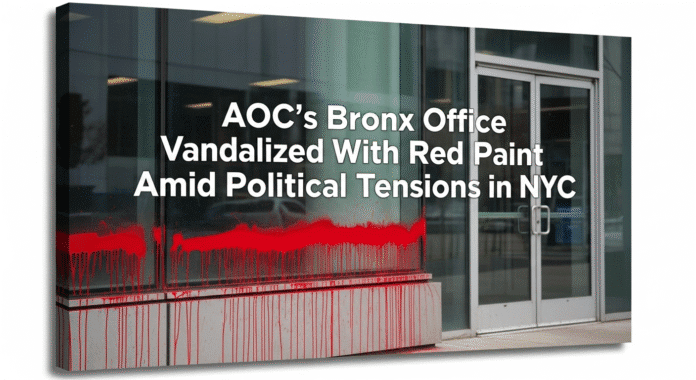Red Paint, Accusations, and a City on Edge: What the Attack on Alexandria Ocasio-Cortez’s Office Reveals About Today’s Political Climate
Rep. Alexandria Ocasio-Cortez’s Bronx campaign office was vandalized with red paint in the early hours of July 21, 2025. The attack, which included a sign accusing her of “funding genocide in Gaza,” has stirred controversy and concern across New York City. This incident, occurring shortly after AOC voted against a Republican amendment to cut U.S. aid to Israel’s Iron Dome, underscores the dangerous intersection of political discourse and public safety. As police work the case and community voices unite, this event offers a stark view of the challenges facing democracy in 2025.
The Incident – What Happened on Herschell Street?
Timeline and Details
On the night of July 21, 2025, just before 12:45 a.m., New York City’s 911 dispatch received an alert about suspicious activity at Rep. Ocasio-Cortez’s campaign office in Westchester Square, Bronx. When the NYPD arrived, they found the building’s metal security gate, doorway, and adjacent sidewalk splattered with red paint. In addition, a sign bearing the message “AOC FUNDS GENOCIDE IN GAZA” had been hung prominently on the office exterior.
No injuries were reported during the incident. The vandalism appears to be politically motivated, linking the act directly to AOC’s recent controversial vote on U.S. aid policies. The stark imagery of red paint, a color often associated with urgency and alarm, has intensified public discussion regarding the vulnerabilities of public officials amid heightened partisan conflicts.
Police Response and Investigation
The NYPD acted quickly by cordoning off the area with crime scene tape. Officers collected evidence including surveillance footage from nearby cameras, which may offer crucial clues for identifying the perpetrators. In a brief statement, the NYPD confirmed, “We take all acts of political vandalism seriously and are pursuing all leads to ensure accountability.” At this time, no arrests have been made, and the investigation remains active. Police officials continue urging anyone with information to reach out via the Crime Stoppers hotline.
Context – Why Was AOC Targeted?
The Political Backdrop
The targeted nature of this vandalism cannot be divorced from the political context in which it occurred. Rep. AOC’s vote against a Republican amendment to cut funding for Israel’s Iron Dome defense has not only sparked outrage but also intensified political debates on U.S. foreign assistance and human rights. In a recent social media post, AOC defended her decision by stating, “I voted against the amendment because it cuts off critical support while letting through policies that result in real harm to innocent lives.”
This act of defiance, seen by some as a stand for humanitarian values, has equally drawn fierce criticism. The message on the vandalized office’s sign explicitly ties AOC’s policy stance to accusations of supporting “genocide in Gaza,” a claim that further illuminates the volatile blend of domestic politics and international affairs. Such politicized symbolism highlights how deeply foreign policy decisions resonate within local communities.
Patterns of Political Hostility
This incident is not isolated. Over the past several months, AOC has experienced growing aggression. In May 2025, during a town hall meeting in Queens, a pro-Palestinian activist verbally attacked the congresswoman, labeling her a “war criminal” for her nuanced stance on the Israel-Palestine conflict. These episodes illustrate that high-profile political figures are increasingly vulnerable to acts of harassment and vandalism, driven by the intense pressures of modern political polarization.
With political discourse becoming ever more charged, such acts of vandalism risk chilling the willingness of elected officials to engage in bold policy decisions. The increasing number of politically motivated crimes has alarmed both community leaders and security experts alike, suggesting a trend that, if left unaddressed, could undermine the fundamentals of democratic engagement.
Community and Political Reactions
Outrage and Concern
The vandalism has ignited a wave of responses from various quarters. Community leaders and local activists have voiced their dismay at the incident. One notable local activist remarked, “This kind of targeted vandalism is a symptom of the broader climate of division and anger in our city. We need to address this before it escalates further.” Across social media platforms, many supporters of AOC have condemned the attack, asserting that such acts are an affront to free speech and representative democracy.
The strong public reaction mirrors the rising impatience with extreme responses to political disagreement, underscoring an urgent need for de-escalation. The image of a well-known campaign office defaced with incendiary language resonates deeply with citizens who value respectful and fact-based debates over acts of vandalism.
Calls for Civility
Experts and political commentators have weighing in on the effects of such hostility. Dr. Emily Carter, a political science professor at NYU, commented, “The recent spate of political vandalism is a sign of our failure to engage in constructive dialogue. When dissent manifests in aggression, it creates further polarization and hinders genuine understanding.” This sentiment has spurred calls from civic organizations to foster environments that encourage peaceful discourse and robust democratic participation.
A chorus of voices now insists that both law enforcement and political leaders work together not just to protect property, but also to safeguard the principles of free expression and democratic engagement.
Broader Implications – What Does This Mean for Our Democracy?
Escalating Risks for Public Officials
The attack on AOC’s office throws a spotlight on a growing crisis: public officials face increasing threats, harassment, and acts of vandalism, which can deter them from exercising their roles freely. A 2024 report from Capitol Police revealed that the number of threats against members of Congress had more than doubled since 2018. Within New York City alone, the NYPD documented 112 instances of politically motivated vandalism in 2024, compared with 87 in 2023.
These statistics reflect a worrying trend. The rise in such incidents poses a real threat to the safety and effectiveness of public officials. As security measures become more pronounced, a divide emerges between elected representatives and the citizens they serve, potentially stifling open and accessible political engagement.
The Cost of Polarization
Political unrest is not only damaging to individuals; it is corrosive to the democratic process. The vandalism at AOC’s office is a vivid reminder of the risks inherent in political polarization. When political disagreements escalate into acts of aggression, the core values of accountability and transparency become endangered. A political analyst recently noted, “The polarization in our politics is not only tearing us apart as a society but also spilling over into actions that threaten the integrity of our democratic institutions.”
Such incidents underline the urgent need for measures that can help restore respectful discourse. As citizens and leaders navigate an increasingly fragmented political landscape, building bridges over divides becomes essential for the survival of our democratic traditions.
Moving Forward – A Call to Action
Building a Safer, More Respectful Civic Space
The recent vandalism underscores an immediate and pressing need for all stakeholders to come together. Strengthening community resilience and fostering respect in political dialogue are critical steps. Local governments and law enforcement agencies must continue to work vigilantly, while community groups need to rally support for initiatives that promote constructive conversation.
Citizens can contribute by staying informed, reporting suspicious activities, and actively engaging with elected officials to promote transparent and respectful governance. Efforts to bridge gaps between divergent political perspectives require everyone to take a stand against acts of intimidation and vandalism.
How You Can Help
If you believe in protecting democratic values and ensuring the safety of public officials, consider taking the following steps:
- Speak out against political violence in your community.
- Support organizations dedicated to promoting civic engagement and dialogue.
- Stay informed about local and national political events.
- Report any suspicious activities or acts of vandalism to local law enforcement.
- Encourage elected officials to prioritize initiatives that enhance public safety and foster community trust.
The power to shape a safer, more inclusive political environment lies in proactive participation. Let this incident serve as a call to come together in defense of respectful and constructive political discourse.
The depredation of Rep. Alexandria Ocasio-Cortez’s Bronx campaign office is a powerful reminder that democracy is under strain. The politically motivated vandalism, marked by red paint and inflammatory messages, symbolizes deeper divisions within our society. As the investigation unfolds and community voices strive for unity, it is essential for all of us to reject violence and embrace dialogue. Join the collective effort to ensure that political disagreement does not devolve into actions that threaten the fabric of our democracy. Stand with your local leaders and become an active participant in nurturing a respectful civic space where every voice matters.



